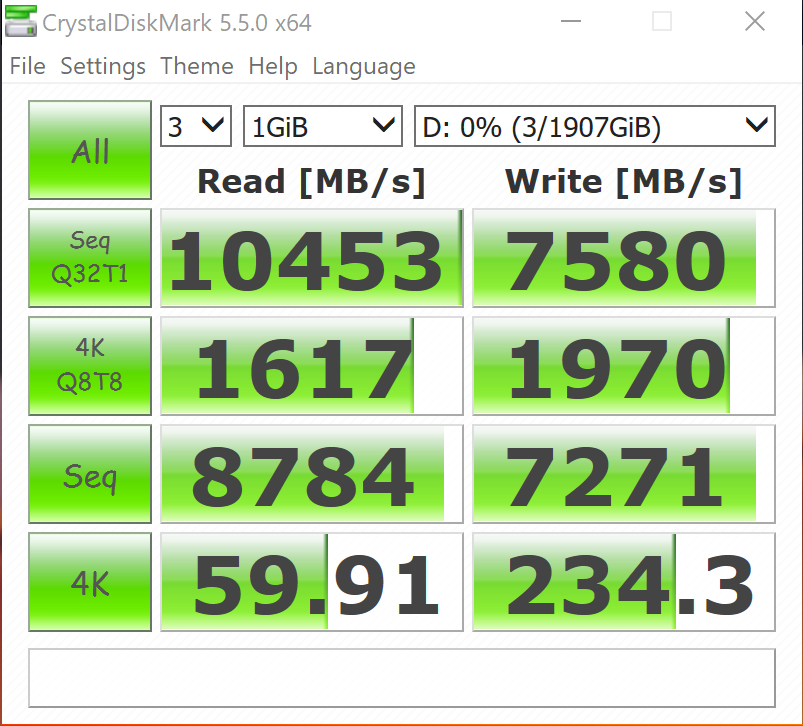CRYSTAL DISK BENCHMARK VER. 5.5 X64
Crystal Disk Benchmark is used to measure read and write performance through sampling of random data which is, for the most part, incompressible. Performance is virtually identical, regardless of data sample so we have included only that using random data samples.
This is what we expected to see from this card and, anything over 10GB/s throughput is great. Having said that, it would have been nice to see those low 4K read and write speeds just a bit higher, as they were in our Samsung 960 Pro NVMe SSD Report.
The toughest benchmark available for solid state drives is AS SSD as it relies solely on incompressible data samples when testing performance. For the most part, AS SSD tests can be considered the ‘worst case scenario’ in obtaining data transfer speeds and many enthusiasts like AS SSD for their needs.
Although our AS SSD speeds are not above 10GB/s, these are still particularly strong scores, considering that this is the bread and butter benchmark for SSD testing. AS SSD is traditionally lower than other programs. Looking at our IOPS, we actually hit 1 million IOPS with the standard NVMe Windows driver, but overall performance is better with the Samsung NVMe driver, at the cost of making that million IOP plateau.
ANVIL STORAGE UTILITIES PROFESSIONAL
Anvil’s Storage Utilities (ASU) are the most complete test bed available for the solid state drive today. The benchmark displays test results for, not only throughput but also, IOPS and Disk Access Times. Not only does it have a preset SSD benchmark, but also, it has included such things as endurance testing and threaded I/O read, write and mixed tests, all of which are very simple to understand and use in our benchmark testing.
Anvil Disk Utilities is another program that traditionally cuts speeds considerably, but we are happy with the result here. IOPS, on the other hand, has dropped significantly compared to the 900K IOPS of AS SSD.
QUICKBENCH 4.0
QuickBench, much like ATTO, throws different sample sizes at the SSD, or in this case RAID array, and measures performance. It is actually Mac based but this PC version of the benchmark is also available.
7GB/s read and 6GB/s write aren’t right up there but, through a compilation of all software, a better overall picture is gained.
 The SSD Review The Worlds Dedicated SSD Education and Review Resource |
The SSD Review The Worlds Dedicated SSD Education and Review Resource | 

Does this support Raid 0 with trim?
RAID 0 no TRIM.
That’s kind of disappointing thanks for answering though
Not sure why it is disappointing when one considers the efficiency of GC and less importance of TRIM these days. The drive was made for Intel drives and VROC first and foremost…that is its ideal answer where there is no trim concerns whatsoever….and it is bootable
I was considering using some NVME (Toshiba, Samsung or maybe the new 700 drives from Intel) in raid as a scratch disk. I’ve been using Sata SSD’s in raid with trim and they perform really well but I’m only writing about 80MB/s and do a lot of write/erase even during the writing as it is. I’d be writing double if I decided to get M.2 drives.. unfortunately Sata SSD prices are increasing in price due to flash prices and maybe losing “popularity” compared to other options available now
TRIM support except RAID 5…but much more expensive. (links to sales included)
https://www.thessdreview.com/daily-news/latest-buzz/highpoint-ssd7101a-1-nvme-raid-controller-review-samsung-toshiba-m-2-ssds-tested/
Will Asrock Z690 PG RipTide support this card ? If yes, any limitations ?